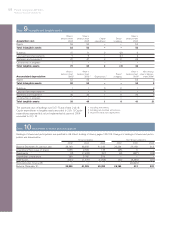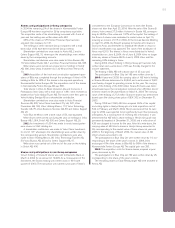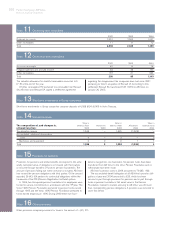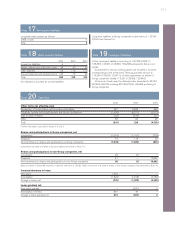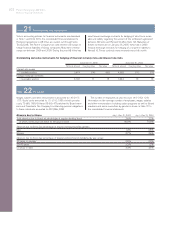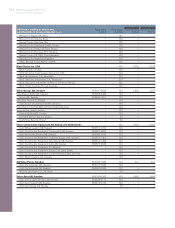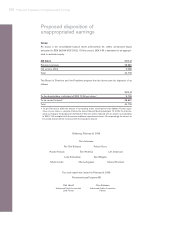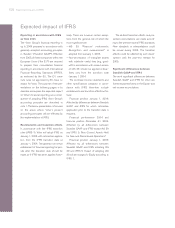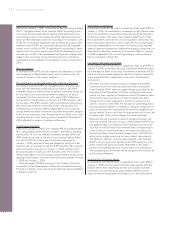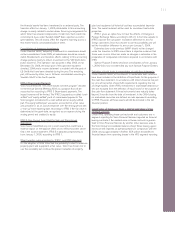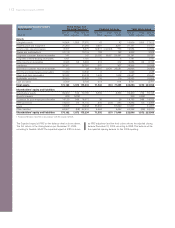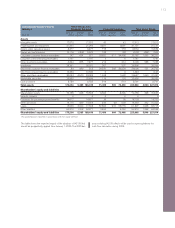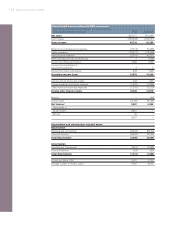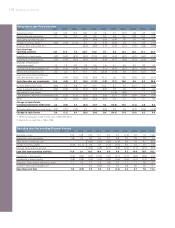Volvo 2004 Annual Report Download - page 110
Download and view the complete annual report
Please find page 110 of the 2004 Volvo annual report below. You can navigate through the pages in the report by either clicking on the pages listed below, or by using the keyword search tool below to find specific information within the annual report.
108 Expected impact of IFRS
Expected impact of IFRS
Reporting in accordance with IFRS
as from 2005
The Volvo Group’s financial reporting is
up to 2004 prepared in accordance with
generally accepted accounting principles
in Sweden (“Swedish GAAP”). Effective
from 2005, all listed companies within the
European Union (“the EU”) are required
to prepare their consolidated financial
reporting in accordance with International
Financial Reporting Standards (“IFRS”),
as endorsed by the EU. The EU carve
outs, rules not approved by EU, have no
impact for Volvo. The purpose of the pre-
sentations on the following pages is to
describe and explain the expected impact
on Volvo’s financial reporting as a conse-
quence of adopting IFRS. Volvo Group’s
accounting principles are described in
note 1. The below presentation is focused
on the areas where Volvo’s present
accounting principles will be effected by
the implementation of IFRS.
Restatements and transition effects
In accordance with the IFRS transition
rules (IFRS 1), Volvo will adopt IFRS on
January 1, 2005, with retroactive applica-
tion from the IFRS transition date at
January 1, 2004. The general rule is that
restatement of financial reporting for peri-
ods after the transition date should be
made as if IFRS has been applied histor-
ically. There are however certain excep-
tions from the general rule of which the
most significant are:
– IAS 39 “Financial instruments:
Recognition and measurement” is
adopted from January 1, 2005.
– Non-amortization of intangible assets
with indefinite useful lives (e.g. good-
will) in accordance with revised version
of IAS 38 should be applied retroac-
tively only from the transition date
January 1, 2004.
The enclosed income statements and
other specifications prepared in accor-
dance with IFRS therefore include
restatements and transition effects as fol-
lows:
Financial position January 1, 2004:
Affected by differences between Swedish
GAAP and IFRS for which retroactive
application prior to the transition date is
required.
Financial performance 2004 and
financial position December 31, 2004:
Affected by all differences between
Swedish GAAP and IFRS except IAS 39
and IFRS 5, “Non-Current Assets Held
for Sale and Discontinued Operations”.
Financial position January 1, 2005:
Affected by all differences between
Swedish GAAP and IFRS including IAS
39 and IFRS 5. Impact of adopting IAS
39 will be charged to Equity according to
IFRS 1.
The defined transition effects and pre-
sented reconciliations are made accord-
ing to the present issued IFRS standards.
New standards or interpretations could
be issued during 2005. The transition
effects could be affected by such devel-
opment until the year-end release for
2005.
Significant differences between
Swedish GAAP and IFRS
The most significant differences between
Swedish GAAP and IFRS for Volvo are
further explained below in the Equity- and
net income reconciliation:


